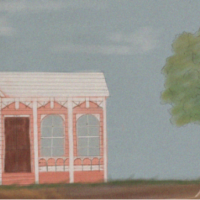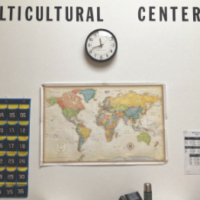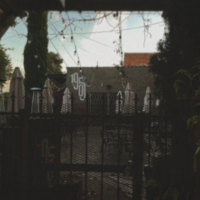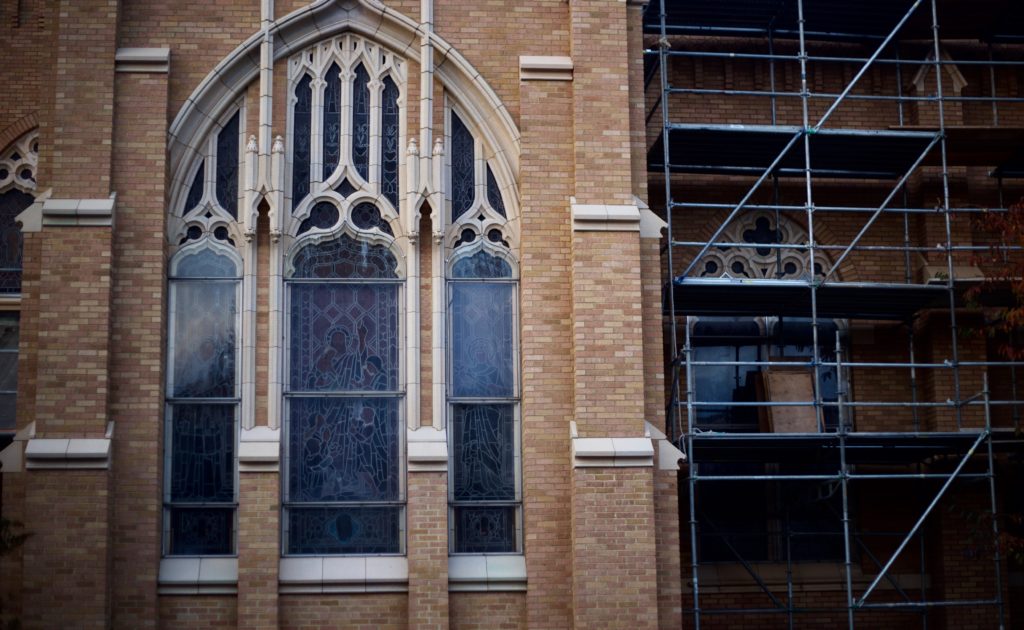
Christianity is at a crossroads.
In 1517 Wittenberg, Germany, Martin Luther’s vehement critiques of the Roman Catholic Church tore Christianity asunder, sparking the Protestant Reformation.
Christianity is now facing a new crisis. Across the United States, denominations are fracturing, largely due to a single disagreement: How to treat members of the LGBTQ+ community.
“Most (Protestant churches) have gone through breaks around the issue of LGBTQ+ inclusion,” says Reverend Erin Martin, the pastor at Fremont United Methodist Church in Northeast Portland, Oregon.
Conservative Methodist churches are currently leaving the United Methodist Church (UMC) in droves: Last year, more than 400 Texan congregations voted to leave over concerns that the UMC had become too liberal, especially regarding LGBTQ+ inclusion.
These splits are by no means denominations’ first upheavals. The Presbyterian Church split and reunited multiple times in the 19th and 20th centuries; since 1988, American Lutheranism has been broken into two major churches: the liberal Evangelical Lutheran Church in America (ELCA) and the conservative Lutheran Church–Missouri Synod (LCMS).
The second half of the 20th century saw a surge of Christianity in America. According to Gallup and the Pew Research Center, 90% of Americans identified as Christians from the 1950s to early ‘70s; in 1972, only 5% were religiously unaffiliated.
“That was the anomalous period in American history, and, really, in all human history,” says Pastor Phillip Brandt at St. Michael’s Lutheran Church, an LCMS-affiliated congregation in Northeast Portland. He attributes the era’s surge in Christianity to a “deep spiritual longing” awoken in people following the Great Depression and World War II.
“Church attendance rates today, even though they plummeted, are still higher than they were in colonial America,” says Brandt. In 1995, Rodney Stark, the late University of Washington professor of sociology and comparative religion, said that only about 17% of Americans were church-goers in 1776.
Nevertheless, the “great communal value” that Americans held in the beginning of the second half of the 20th century, says Brandt, “has been ebbing.”
By the 1990s, according to Pew, the number of religiously unaffiliated Americans had begun to rise — 9% in 1993, 12% in 1996 and 14% in 1998. After the turn of the century, the acceleration only increased. As chronicled by Pew’s Religious Landscape Study, the number of Americans identifying as Christians dropped from 78% to 71% between 2007 and 2014. In Pew surveys in 2018 and 2019, only 65% of adult Americans called themselves Christian.
Mainline Protestant traditions have seen some of the sharpest declines, including the UMC and ELCA. Catholicism is also struggling.
“All churches in North America are in some sort of a decline,” says Brandt.
That decline is due, in part, to the hurt Christianity has inflicted on many.
“We’ve done too much harm, honestly, to the community, to the LGBTQIA+ community,” says Martin. “We can’t compromise anymore.”
Martin sees that harm as inescapable. “Any form of American Christianity is going to have within its stories, history, practices, embedded into it, white supremacy and colonialism,” she says. “Because America, in its founding, (had) all of those things.”
Reverend Thomas Disrud, the associate minister at First Unitarian Church, a Unitarian Universalist congregation in Southwest Portland, attributes some of American Christianity’s recent decline to what he calls an “ethical disconnect.” “If I have a queer child,” he says, “how is it that I can be part of a faith community that would not embrace that child?”
“The Church’s teaching isn’t that homosexuality is a sin. Because if homosexuality is a sin, then heterosexuality is a sin,” says Father Matt Libra, the pastor at St. Rose of Lima Catholic Church and School in Northeast Portland. “Sin resides in our actions … Heterosexual sex outside of the context of marriage is sin … That would be just as much (the) sin of fornication with a heterosexual as it would be with a homosexual.”
According to the Catechism, Catholicism’s official doctrine, “homosexual acts” are “acts of grave depravity,” “intrinsically disordered” and “contrary to the natural law.” The Catechism states, “(Homosexuals) must be accepted with respect, compassion, and sensitivity. Every sign of unjust discrimination in their regard should be avoided.” However, “this inclination … is objectively disordered” and “under no circumstances can (homosexual acts) be approved.”
All unmarried Catholics are expected to live in celibacy, the act of refraining from sexual intercourse.
Libra acknowledges that the Catholic Church does not bless same-sex marriages, making all same-sex intercourse sinful. Thus, according to the Catechism, “homosexual persons are called to chastity,” the virtue accompanying celibacy.
“That’s a heavy cross for homosexual persons,” says Libra.
All Catholic priests take a lifelong vow of celibacy as a renunciation of the passions in favor of pure love of Jesus, according to Vatican City’s official website. Because of this, chastity is seen as a “guarantor of love,” according to Libra.
Some Catholics feel that the Church has erred in its teachings on sexuality.
“It’s not just (the) LGBT community,” says Father Dave Zegar, the pastor at St. Andrew Catholic Church in Northeast Portland. “I think the teachings of the Church reflect a misunderstanding, a lack of understanding, of human sexuality.”
Zegar believes there is “not a consistent application of an understanding of natural law to all issues in the Church.” He believes that as the human race progresses, Christians’ reading of the scripture must continually evolve.
Zegar believes that this broad misunderstanding of human sexuality comes down to the writers of Catholic theology: Most of the priests and theologians who authored the scriptures thousands of years ago, just like Catholic priests today, were celibate, says Zegar.
St. Andrew, Zegar’s parish, has become known for its unwavering support for the LGBTQ+ community. This has led to tension between the congregation and the conservative Portland archbishop, Alexander Sample: In 2013, the parish marched in the Portland pride parade against the archbishop’s prohibition.
As Catholicism has fallen nationally, St. Andrew has grown. According to Zegar, people come from across Portland, northern Oregon and southern Washington because of the church’s unabashed LGBTQ+ acceptance.
“Sometimes I wonder why they stay,” says Zegar. “I’m really thankful that they’re willing to continue to struggle — the fight — because it’s not easy.”
First Unitarian has also become known for its acceptance. “In the ‘70s, we supported ordination and full inclusion for queer folks, which was pretty radical at the time,” says Disrud.
According to Disrud, First Unitarian gained recognition in the 1990s for publically taking liberal stands on social justice issues, which remains an important reason for congregants’ affiliation.
“A lot of violence and hatred is perpetuated by religion. And that’s probably why a lot of churches are losing ground,” says Disrud. Most people “don’t want to be a part of an organization or a group that actively discriminates.”
Brandt feels the opposite may be true. “A lot of churches went chasing after the progressive population and discovered the progressive population doesn’t go to church,” he says. “It’s actually the progressive congregations who are dying. And the more socially conservative congregations are actually doing okay.”
In some places in America, everyone goes to church on Sunday, regardless of the strength of their belief or whether they’ve carefully subscribed to a certain denomination. In Portland, the habit is non-attendance. The Reverend Beth Neel, a co-pastor at Westminster Presbyterian Church in Northeast Portland, says the city has a “suspicion of religion.”
“Now the people who go to church,” says Brandt, “are almost swimming against the stream.”
This lack of compulsory attendance has its pros. Across the board, pastors interviewed for this article felt that although many of their congregations have shrunk, those who continue to attend truly want to be there.
“In Portland,” says Libra, “anybody who’s going to church is not accidentally going to church.”
Brandt feels that Lutheranism is feeling less tension over how to interact with the queer community because the faith has been split into progressive and conservative camps — the ELCA and LCMS — for decades. “If you were a homosexual looking for a community — a Lutheran community — that was going to affirm your homosexuality, they’re all in the ELCA,” says Brandt. “We don’t need to get into fights about this because if you really feel this way, we can hand you off to the ELCA pastor, and you’ll find a place where you don’t have to have the fight. And conversely, they can do the same thing with us.”
Libra does not deny that Catholic officials have hurt people. “Offenses are offenses and they need to be atoned for, period,” he says. “There (have) been individuals in the church who have done harm to homosexuals or the LGBT community.”
However, he makes an important distinction between the errors of Church representatives and the Church itself. “The Church, as the Church founded by Christ, doesn’t say those things, doesn’t say anything contrary to Christ,” he says. If a Catholic official blunders, “they ought to be corrected, they ought to be sanctioned. They ought to have to clarify and make amends. But that doesn’t change the teaching of the Church.”
Recent popes have made laundry lists of apologies for the Church’s historical wrongdoings, including “relegat(ing)” women “to the margins of society and even reduc(ing) (them) to servitude,” as Pope John Paul II said; participation in the slave trade; condemning the astronomer Galileo Galilei of heresy for his belief in heliocentrism; the ongoing sexual abuse of children at the hands of Catholic clergy; the conquest of the Americas; the Inquisition; and the 1204 sacking of Constantinople during the Fourth Crusade. These atrocities were committed by individuals — Pope John Paul II spoke of “the infidelities to the Gospel committed by some of our brethren” — but papal apologies seem to imply institutional responsibility.
Libra did not specifically refer to any of these events; he should not be construed as defending them.
If a low-level Catholic official, like a priest, believes the Church’s doctrine is wrong about something, there is little institutional change they can effect. All they can do is preach what they believe to be the truth, even if it goes against the Church’s official teaching.
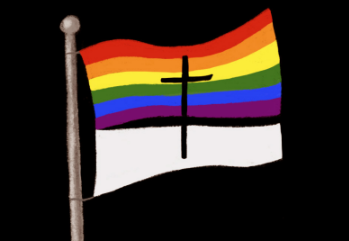
The blowback can be fierce. Zegar says other priests have told him he’s not a real Catholic priest because he welcomes LGBTQ people.
The Catholic Church and Christianity at large are being pulled apart by the issue of how to interact with the LGBTQ+ community. Increasingly, those who wish to reform their denominations are having to face head-on the horrors that have been committed in their God’s name.
“Jesus was regularly dinged for hanging around terrible people. And he hasn’t stopped,” says Brandt. “To expect the Christian community to be a collection of saints instead of a collection of sinners, isn’t actually, probably, realistic in the least.”
This understanding of the Christian community does not excuse its actions. “I’ve seen Christians behave horribly,” says Brandt. “And I don’t know that there’s times where I would want to be a part of that kind of an organization. I absolutely understand why people … are disillusioned with the Christian church.”
Disrud says that young people are particularly disillusioned with religion. “I think that’s because religion doesn’t speak to who they are and what they believe,” he says. “And I don’t see a lot of signs of that improving.”
“There won’t be many young people joining the churches in the future,” says Zegar.
With America’s Christian population continuing to shrink and increasingly open criticism of Christian history, how will the religion adapt?
Brandt says Christians must own their participation in atrocities like the slave trade and the conquest of the Americas. “That means we have to work toward and promote and be part of that solution,” he says.
“We probably need to be disempowered,” says Martin.
Still, religion is by no means on its way out.
The decline of church attendance — and the isolation of the pandemic — has left some Americans with a sense of longing.
“I think that people have realized that they miss community,” says Disrud.
Neel describes that feeling as a “yearning” for community. “ I do think some people will find communities in churches,” she says.
The coming decades of America’s Christian churches will answer a question posed by Disrud: “How will they reinvent themselves?”

